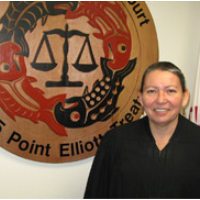Native American Tribes Begin, for First Time, to Prosecute Non-Indian Wife Abusers
 Theresa Pouley, chief judge of Tulalip tribal court (photo: Amy Radil, KUOP)
Theresa Pouley, chief judge of Tulalip tribal court (photo: Amy Radil, KUOP)
Imagine being powerless to prosecute crimes committed against your citizens. That’s the situation that Native American tribes have been in when non-Indians commit domestic violence against Native Americans on a reservation.
Now, some tribal authorities will have the power to prosecute those crimes, thanks to a pilot program being instituted by the U.S. Justice Department.
On Thursday, it was announced that three tribes, the Pascua Yaqui Tribe in Arizona, the Umatilla Tribes of Oregon and Tulalip Tribes of Washington, will be allowed to arrest and prosecute non-Indians accused of domestic violence on tribal lands starting February 20.
The project is a result of the Violence Against Women Reauthorization Act of 2013. “Every day, we're working hard to strengthen partnerships with tribal leaders and confront shared challenges—particularly when it comes to protecting Indian women and girls from the shocking and unacceptably high rates of violence they too often face,” Attorney General Eric Holder said in a statement. The new jurisdiction won’t go into effect for all tribes until next year.
“The old jurisdictional scheme failed to adequately protect the public, particularly native women, with too many crimes going unprosecuted and unpunished amidst escalating violence in Indian Country,” Associate Attorney General Tony West said.
Republicans fought the expanded jurisdiction provisions of the bill, saying tribal courts would be unfair to non-Indian defendants. Sen. Charles Grassley (R-Iowa) said that “you got to have a jury that is a reflection of society as a whole, and on an Indian reservation, it’s going to be made up of Indians, right? So the non-Indian doesn’t get a fair trial.”
According to a 2004 study by the Justice Department, the rate of violent crime committed against Native American females was more than double the rate for all U.S. females.
The restrictions on the prosecution of non-Indians by tribal authorities stems from a 1978 Supreme Court decision, Oliphant v. Suquamish Indian Tribe. The court held that even a violent crime that was committed by a non-Indian husband against his Indian wife in their home on a reservation could not be prosecuted by the tribe\.
“Our judicial system, like all other judicial systems, will now have the opportunity to address offenders for wrongs committed against our most vulnerable community members,” Pascua Yaqui tribal chairman Peter Yucupicio told The Los Angeles Times. “We no longer have to simply stand by and watch our native women be victimized with no recourse.”
-Steve Straehley
To Learn More:
3 tribes Authorized to Prosecute Non-Native American Men in Domestic Violence Cases (by Sari Horwitz, Washington Post)
Tribes Get more Power to Handle Domestic Violence Cases (by Cindy Carcamo, Los Angeles Times)
Native Americans Win Right to Prosecute Non-Indians in Tribal Courts (by Matt Bewig, AllGov)
- Top Stories
- Unusual News
- Where is the Money Going?
- Controversies
- U.S. and the World
- Appointments and Resignations
- Latest News
- Trump Renames National Football League National Trump League
- Trump to Stop Deportations If…
- Trump Denounces World Series
- What If China Invaded the United States?
- Donald Trump Has a Mental Health Problem and It Has a Name






Comments